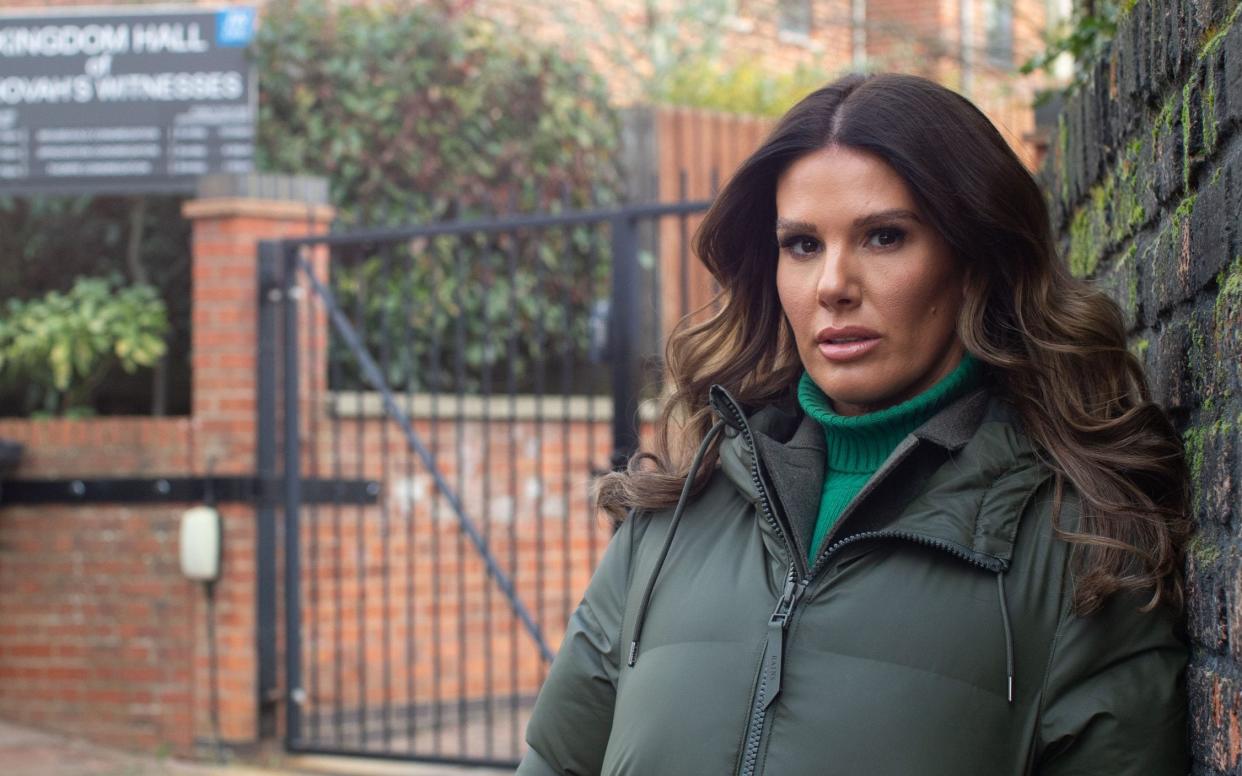Rebekah Vardy accuses Jehovah's Witnesses of covering up her sexual abuse

Rebekah Vardy has accused the Jehovah’s Witnesses of having covered up the sexual abuse she suffered as a child at the hands of a fellow member of the church.
Ms Vardy, the wife of Leicester City’s and England star Jamie, also claims the church failed to protect other children from predatory men within its ranks.
She has now made a Channel 4 documentary about her ordeal with others that suffered and who were “shunned” by their own families when they tried to leave the Jehovah’s Witnesses.
Ms Vardy, whose mother was a Jehovah’s Witness, claims that when she was a young teenager church elders refused to inform the police after she told them she had been sexually abused.
In the documentary, Rebekah Vardy: Jehovah’s Witnesses and Me, she says: “What happened to me during my childhood still affects me every single day.
“From the age of around 12-years-old I was being abused and instead of being supported I was blamed.”
The claims are vigorously denied by the organisation. In the documentary Ms Vardy - who admits in the programme that she has become famous for her unsuccessful attempt to sue Wayne Rooney’s wife Colleen for libel - investigates the iron grip she claims church tries to maintain over every aspect of its members’ lives.
Its adherents do not celebrate Christmas or their birthdays and can be ‘defellowshipped’ for transgressing strict moral codes on sex, drinking, swearing, gambling and other lifestyle issues.
Ms Vardy said the sexual abuse she suffered was dismissed as “affection” when she finally plucked up the courage to tell the elders in her local Kingdom Hall.
Not believed
She says that her mother did not believe her and that when she turned to senior church figures in her home town of Norwich, Norfolk, at the age of 15 they dismissed her claims.
“I was told that I had misinterpreted the abuse and that it was a form of affection. I knew I hadn’t. I was well aware of what was right and what was wrong, but I was manipulated into believing that it wasn’t right to take it to the police,” she says.
Ms Vardy said the abuse, and the refusal of the church to confront the issue, led her to begin playing truant from school and to making a series of “terrible decisions” about her life.
In tears, she tells the documentary team: “It’s hard to know how I survived that. No one valued me enough to protect me.”
During the making of the programme Ms Vardy met a number of former Jehovah’s Witnesses who were shunned by the church after making claims of sexual abuse - and other complaints - against fellow members.
Laura, a former member from Northern Ireland, tells Ms Vardy she was sexually abused from the age of eight by a member of the church who was a family friend, but that her local elders took no action when she told them, believing his side of the story.
When she eventually went to the police herself, the man was charged and later handed an 18-month suspended sentence and placed on the sex offenders register for 10 years. Laura, who found herself shunned by the church, tells Ms Vardy: “He injured me. I was disgusted with myself. I felt so ashamed. I think that he stole my life.”
Accused in person
In the documentary, Ms Vardy is filmed attempting to put her accusation in person to someone at the JW’s sprawling multi-million UK headquarters, called Bethel, in Chelmsford, Essex. Nobody answers the intercom at the main gate and when she calls the head-office number she is told there is no one inside available to speak to her.
“Oh, that’s a shame,” she replies. “I was hoping to talk to someone from the organisation about my experiences as a child. Well, have a lovely day.”
In one moving scene, Ms Vardy is invited to celebrate Christmas with other former Jehovah’s Witnesses at a gathering organised by Faith to Faithless, a section of Humanists UK, which provides support for those who have had to rebuild their lives after being shunned.
Ms Vardy urged any young person who, like her, felt trapped by the church to seek outside help. She told The Telegraph: “Go to someone you can trust, usually outside the organisation. The [church] only cares about what’s right for them.”
The Jehovah’s Witnesses strongly denies that it fails to take action when presented with allegations of sexual abuse perpetrated by its members and that it is “false and offensive” to say they try to prevent the authorities investigating sex abuse claims.
It also denies that shunning contributes to suicides among former members. In a statement the church added: “It is false to say our members live cloistered lives and it is misleading to imply our religion is controlling.”
Rebekah Vardy: Jehovah’s Witnesses and Me is on Channel 4 on May 16, at 10pm.
Listen to The Telegraph’s five-part podcast series on abuse within the Jehovah's Witnesses, Call Bethel, on Apple Podcasts, Spotify, or wherever you get your podcasts.

 Yahoo News
Yahoo News 
